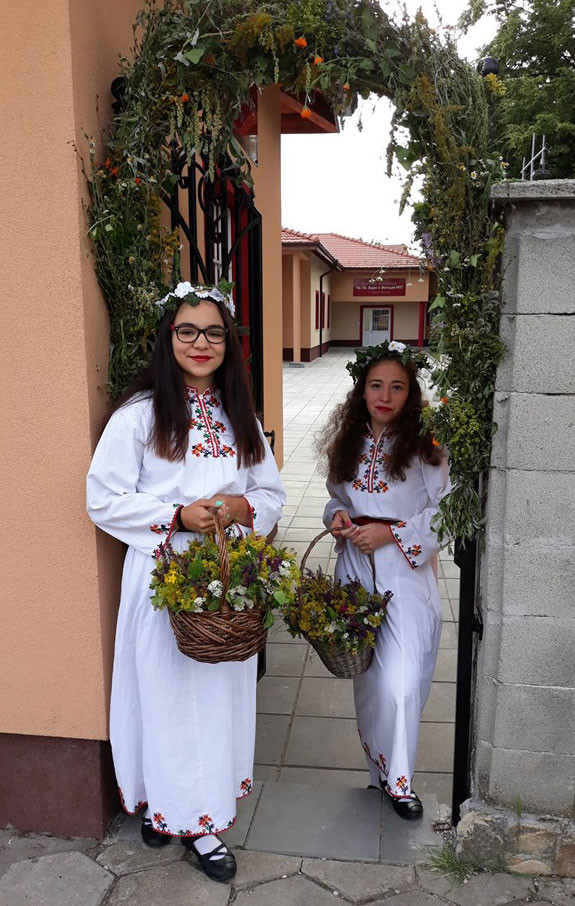On 24 June the Bulgarian Orthodox Church honours one of the most revered Christian saints – John the Baptist. In folklore tradition the day is called Enyovden, Midsummer’s day, and it is connected with different rituals and beliefs connected with the sun, water and the Earth.
The date is close to summer solstice, that is why on Enyovden people look up to the sun and try to read what it portends. According to popular belief this is a day on which we need to be awake at sunup, because the sun “flickers” and “dances” in the sky, and if we see this happening we shall be healthy throughout the year. Again according to popular belief, Enyovden portends the coming of winter, though it may still seem far off. It is believed that before “turning towards winter” the sun takes a dip in lakes and rivers, making their water curative, so before dawn everyone should wash with running water from as stream and roll around in the dew for health. Herbs picked before the sun is up on Enyovden are believed to be at their most potent. It is said that one must pick 77 herbs and a half because that is the number of diseases there are in the world, and the half is the herb that shall cure the disease that has no name.
Enyovden is a popular day, eagerly awaited in the village of Dolni Bogrov near Sofia. There, women put on white shirts and, early in the morning, go out to pick herbs – there are many and different herbs in the environs. Rumyana Krustanova who organizes the events on Enyovden says that the idea to revive old traditions came spontaneously a few years ago, and since then interest has been growing.
 “We, the women of the village, decided to get together dressed in traditional clothing and revive the Enyovden tradition, just for a laugh. We have herbs we have been doing it every year since then. We tie posies for health, I go around the village and give posies to strangers, again for health. We make a wreath which we hang over the door of the chitalishte – culture community centre – and people walk under it and go and take one of the posies we have made. Enyovden really is fun, and everyone wants a photograph taken with the flowers and the wreath we have made out of herbs. It gets to be really big, so it can cover the chitalishte door entirely – from top to bottom. We pick a lot of herbs in the fields, enough to go round the whole village and the environs. We go to the region of Kremikovtsi, and there too there are women who revive the tradition. There our girls, clad in white shirts take the baskets full of herbs we have brought with us, and go round and give out posies. We have been doing that for years and our neighbours from Kremikovtsi know us and expect our coming.”
“We, the women of the village, decided to get together dressed in traditional clothing and revive the Enyovden tradition, just for a laugh. We have herbs we have been doing it every year since then. We tie posies for health, I go around the village and give posies to strangers, again for health. We make a wreath which we hang over the door of the chitalishte – culture community centre – and people walk under it and go and take one of the posies we have made. Enyovden really is fun, and everyone wants a photograph taken with the flowers and the wreath we have made out of herbs. It gets to be really big, so it can cover the chitalishte door entirely – from top to bottom. We pick a lot of herbs in the fields, enough to go round the whole village and the environs. We go to the region of Kremikovtsi, and there too there are women who revive the tradition. There our girls, clad in white shirts take the baskets full of herbs we have brought with us, and go round and give out posies. We have been doing that for years and our neighbours from Kremikovtsi know us and expect our coming.”
According to folk tradition, men are not allowed to attend the rituals of herb picking and tying of posies because of the mystery of fortune telling. At the end of the day the ritual flowers and herbs are hung up in different places around the home. It is believed that if they are picked on Enyovden they shall preserve their curative properties throughout the year. Our ancestors knew herbs well and gathered them in the fields for their medicinal properties. “For every ailment there is a herb,” as the popular saying goes.
The heart and rhythm of the Bulgarian spirit – with these words we can metaphorically define the National Festival of Bulgarian Folklore. Traditionally, since the distant 1965, the event has been organized once every five years on the first weekend of..
The number of Bulgarian folk dance ensembles abroad is growing and, alongside Bulgarian schools, they are among the key centres that unite compatriots overseas and preserve their connection to their roots. Recently, some of these dance troupes returned..
A Bulgarian amateur folk choir based in Italy has returned to Bulgaria for its debut performance before a home audience. Most members of the choir, named Beli Rozi (White Roses) , have lived in the southern Italian city of Pescara for over a decade...

+359 2 9336 661
